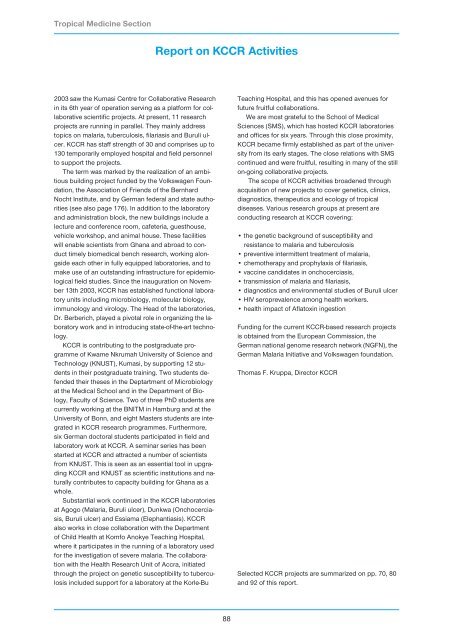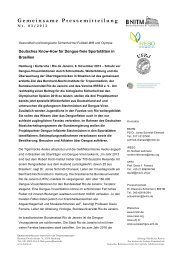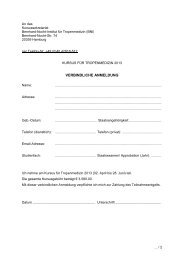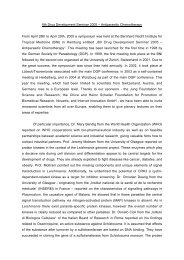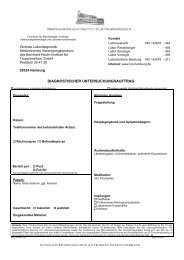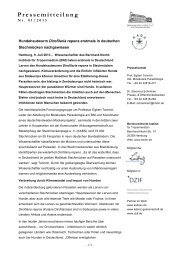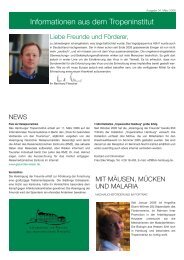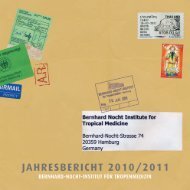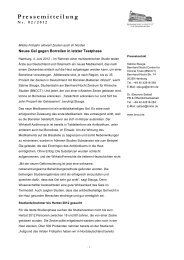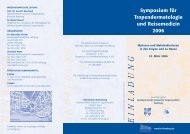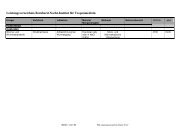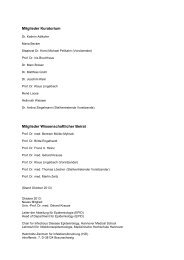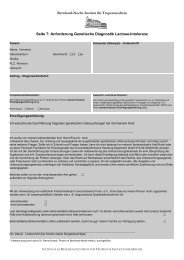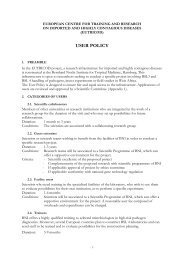Research Group Heussler (Malaria I) - Bernhard-Nocht-Institut für ...
Research Group Heussler (Malaria I) - Bernhard-Nocht-Institut für ...
Research Group Heussler (Malaria I) - Bernhard-Nocht-Institut für ...
You also want an ePaper? Increase the reach of your titles
YUMPU automatically turns print PDFs into web optimized ePapers that Google loves.
Tropical Medicine Section<br />
2003 saw the Kumasi Centre for Collaborative <strong>Research</strong><br />
in its 6th year of operation serving as a platform for collaborative<br />
scientific projects. At present, 11 research<br />
projects are running in parallel. They mainly address<br />
topics on malaria, tuberculosis, filariasis and Buruli ulcer.<br />
KCCR has staff strength of 30 and comprises up to<br />
130 temporarily employed hospital and field personnel<br />
to support the projects.<br />
The term was marked by the realization of an ambitious<br />
building project funded by the Volkswagen Foundation,<br />
the Association of Friends of the <strong>Bernhard</strong><br />
<strong>Nocht</strong> <strong>Institut</strong>e, and by German federal and state authorities<br />
(see also page 176). In addition to the laboratory<br />
and administration block, the new buildings include a<br />
lecture and conference room, cafeteria, guesthouse,<br />
vehicle workshop, and animal house. These facilities<br />
will enable scientists from Ghana and abroad to conduct<br />
timely biomedical bench research, working alongside<br />
each other in fully equipped laboratories, and to<br />
make use of an outstanding infrastructure for epidemiological<br />
field studies. Since the inauguration on November<br />
13th 2003, KCCR has established functional laboratory<br />
units including microbiology, molecular biology,<br />
immunology and virology. The Head of the laboratories,<br />
Dr. Berberich, played a pivotal role in organizing the laboratory<br />
work and in introducing state-of-the-art technology.<br />
KCCR is contributing to the postgraduate programme<br />
of Kwame Nkrumah University of Science and<br />
Technology (KNUST), Kumasi, by supporting 12 students<br />
in their postgraduate training. Two students defended<br />
their theses in the Deptartment of Microbiology<br />
at the Medical School and in the Department of Biology,<br />
Faculty of Science. Two of three PhD students are<br />
currently working at the BNITM in Hamburg and at the<br />
University of Bonn, and eight Masters students are integrated<br />
in KCCR research programmes. Furthermore,<br />
six German doctoral students participated in field and<br />
laboratory work at KCCR. A seminar series has been<br />
started at KCCR and attracted a number of scientists<br />
from KNUST. This is seen as an essential tool in upgrading<br />
KCCR and KNUST as scientific institutions and naturally<br />
contributes to capacity building for Ghana as a<br />
whole.<br />
Substantial work continued in the KCCR laboratories<br />
at Agogo (<strong>Malaria</strong>, Buruli ulcer), Dunkwa (Onchocerciasis,<br />
Buruli ulcer) and Essiama (Elephantiasis). KCCR<br />
also works in close collaboration with the Department<br />
of Child Health at Komfo Anokye Teaching Hospital,<br />
where it participates in the running of a laboratory used<br />
for the investigation of severe malaria. The collaboration<br />
with the Health <strong>Research</strong> Unit of Accra, initiated<br />
through the project on genetic susceptibility to tuberculosis<br />
included support for a laboratory at the Korle-Bu<br />
Report on KCCR Activities<br />
88<br />
Teaching Hospital, and this has opened avenues for<br />
future fruitful collaborations.<br />
We are most grateful to the School of Medical<br />
Sciences (SMS), which has hosted KCCR laboratories<br />
and offices for six years. Through this close proximity,<br />
KCCR became firmly established as part of the university<br />
from its early stages. The close relations with SMS<br />
continued and were fruitful, resulting in many of the still<br />
on-going collaborative projects.<br />
The scope of KCCR activities broadened through<br />
acquisition of new projects to cover genetics, clinics,<br />
diagnostics, therapeutics and ecology of tropical<br />
diseases. Various research groups at present are<br />
conducting research at KCCR covering:<br />
• the genetic background of susceptibility and<br />
resistance to malaria and tuberculosis<br />
• preventive intermittent treatment of malaria,<br />
• chemotherapy and prophylaxis of filariasis,<br />
• vaccine candidates in onchocerciasis,<br />
• transmission of malaria and filariasis,<br />
• diagnostics and environmental studies of Buruli ulcer<br />
• HIV seroprevalence among health workers.<br />
• health impact of Aflatoxin ingestion<br />
Funding for the current KCCR-based research projects<br />
is obtained from the European Commission, the<br />
German national genome research network (NGFN), the<br />
German <strong>Malaria</strong> Initiative and Volkswagen foundation.<br />
Thomas F. Kruppa, Director KCCR<br />
Selected KCCR projects are summarized on pp. 70, 80<br />
and 92 of this report.


